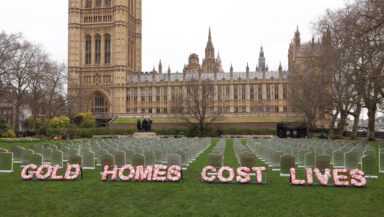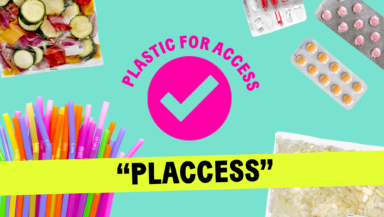Over 30 climate and fuel poverty activists have occupied a hall at the heart of Parliament urging prime-minister-in-waiting Rishi Sunak to end the political chaos and tackle the fuel poverty crisis.
Pictures and footage available here shortly
Activists from Greenpeace and Fuel Poverty Action entered the Palace of Westminster as tourists and visitors earlier today. They are now occupying the Central Lobby, linking arms and reading testimonies from people struggling with their bills from all over the UK and have unfurled a banner reading ‘Chaos costs lives’.
The activists, endorsed by Disabled People Against Cuts, are demanding that the next prime minister start putting the welfare of the British people before fossil fuel companies by properly taxing oil and gas profits and launching a nationwide home insulation programme to tackle fuel poverty. Fuel Poverty Action and Disabled People Against Cuts are also calling for Energy For All – a universal, free band of energy to cover the basics like keeping warm and keeping the lights on.
As Chancellor, Rishi Sunak successfully torpedoed proposals for expanding home insulation after overseeing the debacle of the Green Homes Grant scheme, the scrapping of which left homeowners disappointed and businesses out of pocket. He also reluctantly and belatedly brought in a weak windfall tax on oil and gas profits which contained loopholes that allow fossil fuel giants to discount 80% of their investment in oil and gas from their windfall tax bill.
As Sunak is set to be confirmed as the UK’s next prime minister, the activists have brought copies of people’s energy bills to the Lobby of Parliament. They are reading out testimonies from bill-payers, addressed to Sunak, bringing their voices into the heart of government. The activists including Greenpeace UK’s new co-Executive Director, Will McCallum, are there to add the voices of disabled people and people experiencing fuel poverty to the growing movement of public outrage over the government’s mishandling of the energy crisis. The protest follows in the wake of the month-long rolling demonstrations outside Parliament by climate campaigners.
Nearly one in four households are currently in fuel poverty in the UK. The current Chancellor, Jeremy Hunt, recently announced that the energy price guarantee scheme will end in its current form in April next year. Unless the government provides extra targeted support, the number of households in fuel poverty is expected to rise sharply to almost 11 million.
Nearly 40% of households in Sunak’s constituency could be in fuel poverty by next April if the government ends the energy price guarantee without providing further support, according to estimates by fuel poverty campaigners.
Greenpeace UK’s co-Executive Director, Will McCallum, said:
“Chaos costs lives. Since Boris Johnson resigned as prime minister, this government has spent more time looking for a new leader than leading the country. We now need a government capable of confronting crises, not creating them. Almost a quarter of the country is suffering fuel poverty thanks to ridiculous gas prices and the oldest, coldest housing in Europe. Winter is coming and lives will be lost if the government keeps failing to solve the problem. Rishi Sunak should have realised by now the huge mistake he made by blocking plans for warmer homes and failing to properly tax fossil fuel giants. People need permanently lower bills and a safe climate, and that means more renewable energy, more financial support, a nationwide street-by-street insulation programme, and a proper tax on the energy profiteers to pay for it. We’re here carrying voices from across the country to make the politicians listen to the people, stop the circus and act, before it’s too late.”
Martha Foulds, activist with DPAC, said:
“The energy crisis is not a new event for disabled people. After 12 years of brutal austerity, cuts to disabled people’s wages and social security benefits have made it harder and harder for disabled people to afford everyday living costs like fuel bills. Many disabled people need extra energy to keep warm or charge assistive technology but more than 900,000 households with a disabled person are living in fuel poverty, with this figure only set to rise as fuel prices increase. We are calling for the freezing of oil and gas profits instead of the freezing of disabled people.”
Ruth London, from Fuel Poverty Action, said:
“Last week, while the government was caught up in its own internal manoeuvres, Fuel Poverty Action delivered a petition with over 650,000 signatures calling for Energy For All, to ensure that everyone could keep warm this winter. Energy For All would give each household – free – enough energy to cover the basics like heating, cooking and lighting, paid for by windfall taxes, ending fossil fuel subsidies, and higher prices for what people use beyond what they actually need. Despite the truly massive support for this measure and the many MPs from different parties who support it, so far it has been ignored by a government that seems to be focussed only on staying in power. How many people have to die in cold homes before this proposal is considered? When will our homes be brought up to a European standard of repair and insulation?”
Rocketing gas prices and poor home insulation have been widely blamed for the energy crisis hitting millions of households. The number of UK homes being insulated dropped by 95% between 2012 and 2020, while between April and June this year, BP and Shell made adjusted profits of $8.45bn and $11.47bn respectively. The activists are calling for the government to use the vast excess profits being made by fossil fuel companies to help those most in need, with a proper, loophole-free windfall tax to fund more support for households with their bills and a national programme of home insulation. Greenpeace calculates that £6 billion of dedicated public spending on domestic insulation and energy efficiency is needed immediately to kickstart a national rollout over the next two years.
Nearly half of all people living in poverty in the UK are disabled or living with a disabled person. In addition to higher rates of unemployment and underemployment, disabled people have higher living costs and lower incomes, and are more likely to live in cold homes.
ENDS
Contact:
Greenpeace UK press office at press.uk@greenpeace.org or on 020 7865 8255
Ruth London, Fuel Poverty Action – fuelpovertyaction@gmail.com or 07751 748 026



